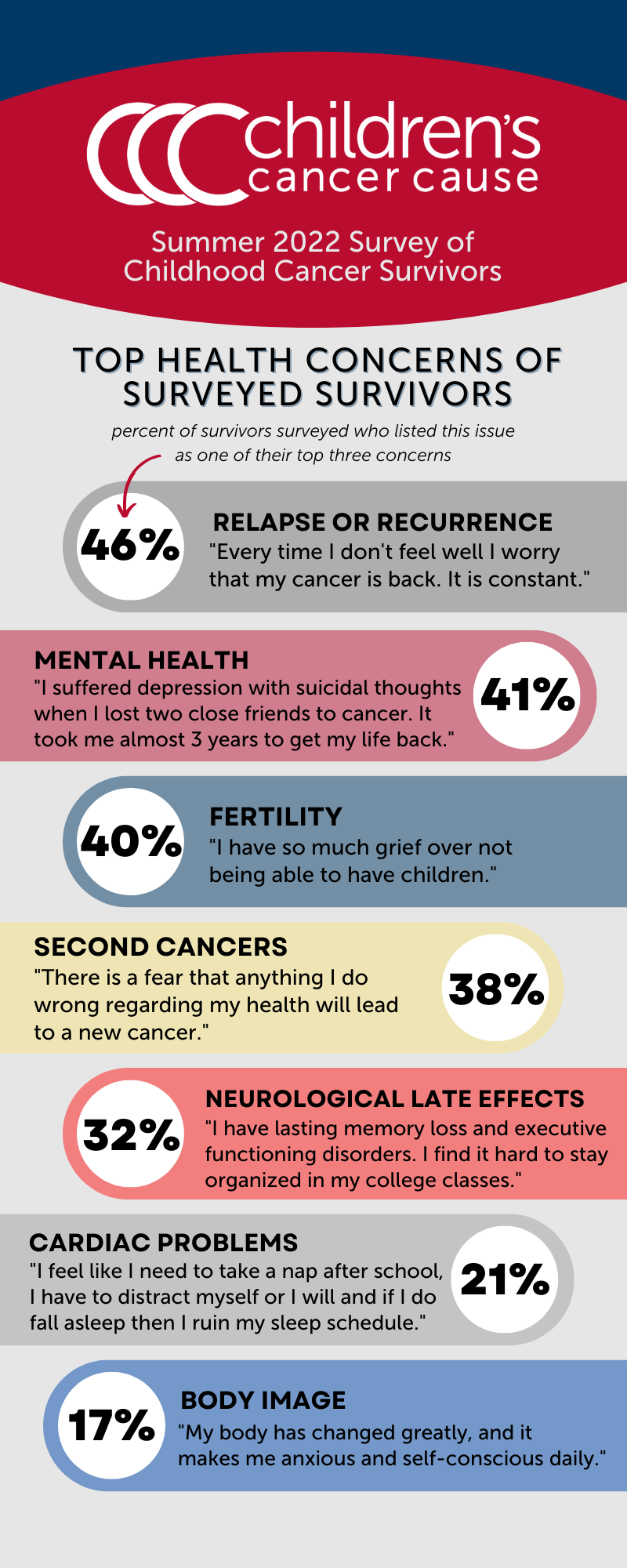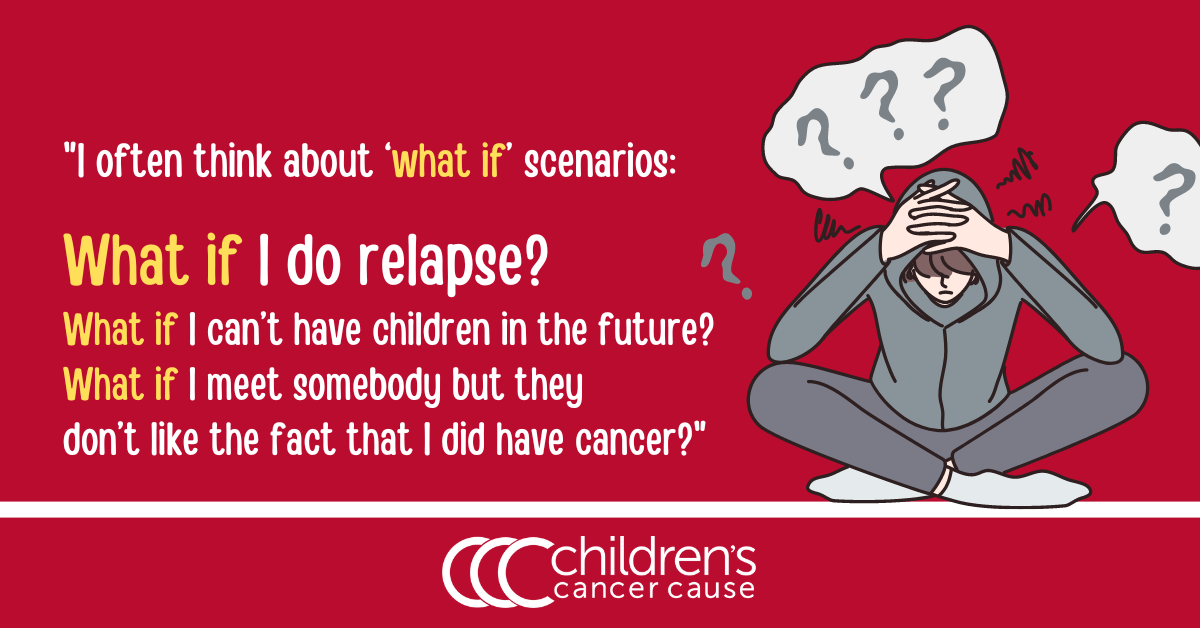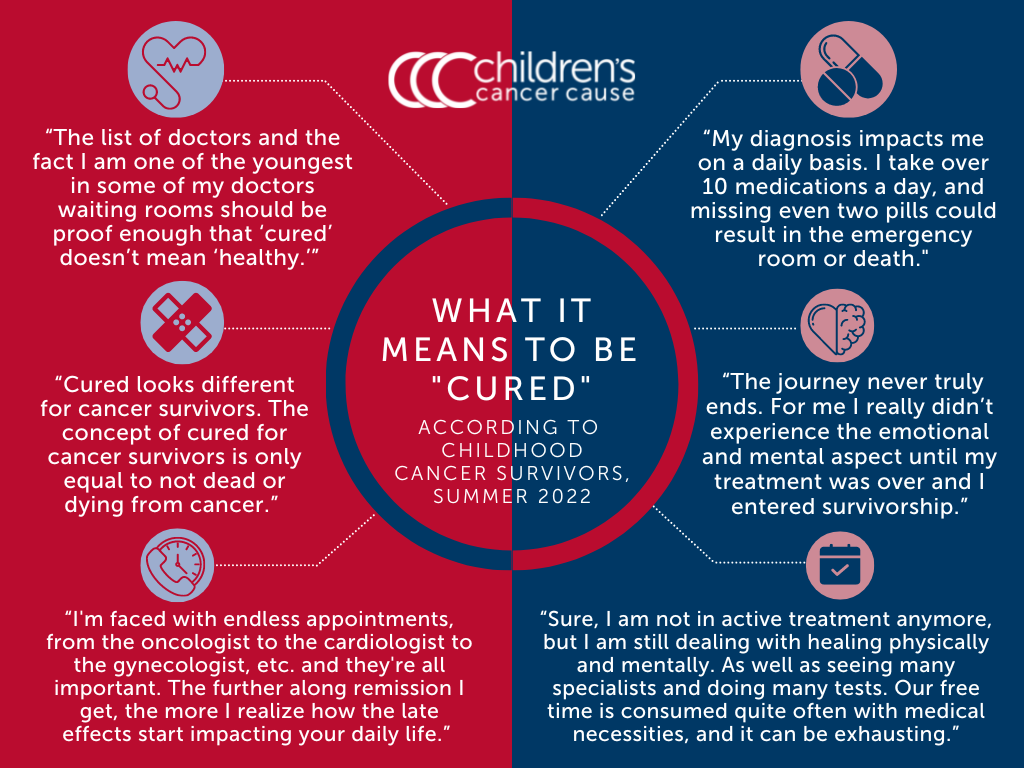2022 Survivorship Survey Results: Fear of Relapse, a Public Misperception of ‘Cured,’ and Gaps in Survivorship Care Plan Utilization
We invited teen, young adult, and adult survivors of childhood cancers to participate in our annual survey of survivor needs in the summer of 2022, and we’ve collected invaluable feedback that will ensure we are best representing the unique needs of childhood cancer survivors in our program planning and in our policy work on Capitol Hill. As our team continues to hold action-oriented discussions about survey findings with leadership groups including our Board of Directors and Survivorship Advisory Council, we’re also pleased to make much of this information publicly available below to highlight the unique challenges facing the nation’s 500,000 childhood cancer survivors.
Top Health Concerns —
Relapse or recurrence was named by almost half of the survivors we surveyed as one of their top three health concerns. In response to a separate, open-ended question asking about how cancer or its late effects impacts daily life, there was a repeated theme surrounding the crippling fear and anxiety about the prospect of relapse:
“It's important to realize that life doesn't go back to being rainbows and butterflies; it's actually living with a constant fear that the cancer will return.”
“I routinely check my neck and armpits for lymph nodes and get anxiety over any cold symptoms due to fear of recurrence.”
“I worry that every little ache or pain is cancer.”
“I get anxious over any small pain in my body. One time I had a cold and my dad thought it was cancer so we had it checked out.”
“I've been cancer free for about 8 months and I am constantly checking for swollen lymph nodes. Every time I get tired the fear creeps in that it's because I'm relapsing.”
Mental health, fertility, and second cancers were other top-ranking health concerns, as shown in the chart to the right. Here are a few specific comments on these issues. One survivor wrote: “I was treated medically but provided no mental health care during treatment because the local hospital had no one on their staff. The local nonprofit had no one. Every facility should be required by law to treat the “whole” patient. Especially during primary adolescence when it’s confusing enough?”
Of less concern to survivors (fewer than 10% listed these as one of their top three health concerns): lung damage, hearing loss, chronic pain or fatigue, and sexual health.
More about fertility: These issues of top concern align closely with a later question on the survey asking survivors about issues they’d like to learn more about “in the context of educational survivorship content.” Two-thirds answered “late effects risks,” and approximately half (48%) specified “intimacy, relationships, fertility.” Here are a few specific comments shared with us about fertility:
“Fertility is my biggest grief and heartache. I wish there was more support groups for other young women dealing with infertility.”
“How will I live with my chronic conditions as a parent later on?”
“I wish I could have children but my heart is damaged.”
“I am not ready to have kids but I wonder if I will be able to when I am ready.”
“I need a surrogate due to the hormones of pregnancy and my tumor relapsing.”
Relapse: Prevalence, Coping, and a Healthy Lifestyle —
Because the fear of relapse is consistently the top issue of concern when we survey survivors, we dug a little deeper into it this year with additional questions focused on this topic.
First, we learned that relapse is not an unfounded fear: One in four survivors we surveyed have experienced a relapse or recurrence of their primary cancer, and eight percent have been diagnosed with a second (new and different) cancer.
We asked survivors: How do you cope with your anxiety about relapse or fears about a new cancer diagnosis?
Most of the respondents selected at least one positive form of coping, from exercise (42%) to counseling sessions with a mental health professional (29%).
Survivors take comfort in being proactive with their health: 42% say that focusing on healthy lifestyle choices and 39% say strict adherence to their follow-up care plan are some of the ways they cope with their anxiety about relapse. The next question takes a closer look at healthy lifestyle choices.
One in four report taking prescription medication to cope with their anxiety.
Troublingly, 11% of respondents selected just one answer: “I’m not doing anything to cope with my anxiety.”
Related to a healthy lifestyle, we asked: Which of these self-care recommendations do you regularly practice?
Follow-Up Care and Survivorship Plans —
Half of the survivors we surveyed (51%) report that they are currently receiving follow-up care from a survivorship clinic. An additional 29% of survivors report that they are “receiving follow-up care but not from a survivorship clinic,” and 17% answered that they are not receiving follow-up care.
When cancer survivors transition from active treatment to general care, it is recommended that they receive a record of treatment (summary of care) to pass along to other physicians. Survivors should also have a documented survivorship plan (Survivorship Care Plan) that outlines specific concerns and recommended health screenings. In our survey this summer, 30% of respondents answered that they don’t know or did not receive a summary of care or treatment history.
We also heard frustration from the older generation of survivors about a lack of survivorship care plans for those diagnosed decades ago:
“There is a large gap for survivors treated in the 70s, 80s, and 90s because ‘survivorship care’ started becoming a thing only recently. How do we bridge the gap for adult long-term survivors who may no longer qualify for survivorship clinics and/or don't have a survivorship care plan?”
“I always feel like it is a struggle to explain to my other doctors that my chemo - even though it took place over 20 years ago - can and does still impact my health. I believe a lot of doctors are unaware of childhood cancer treatment late effects, because they don’t normally see people in 20 year remission. I feel no matter how much time has passed, they should know the effects are still there. While I have worked with most of my doctors for years and had plenty of time to move around and find some good ones, sometimes I need a specialist and it isn’t easy to find anyone who understands long term survivorship.”
“The biggest is that survivorship plans weren’t a thing back when I was being released by my oncologist, it was more of ‘yay she survived, let’s see how long she survives post cancer.’”
On the other hand, some survivors who do have a summary of care and survivorship plan report an under-utilization of this information: 15% of those with a Survivorship Care Plan responded that they haven’t looked at it “in a while,” “rarely,” or “never.”
Similarly, 18% of respondents told us that their general practitioner (or other non-oncology doctor) is “rarely” or “never” up-to-date about the survivor’s prior cancer history and related follow-up needs. Two-thirds of survivors report that their GP is “always” or “usually” well-informed.
The Public Misperception of “Cured” —
Survivors expressed frustrations about the concept that being post-treatment (or “cured”) means that a cancer survivor’s health problems are over.
We asked: “What would you like others to know about your life as a survivor of childhood cancer?” and here is some of what we heard:




